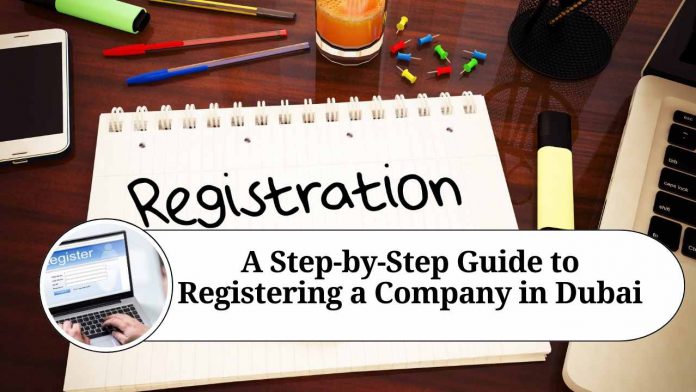Introduction
Dubai, known for its thriving economy and business-friendly environment, has become a preferred destination for entrepreneurs looking to establish their companies. Setting up a company in Dubai can be an exciting venture, but it is important to navigate the registration process correctly. In this blog, we will provide you with a comprehensive step-by-step guide on how to register a company in Dubai, ensuring a smooth and successful incorporation.
Step 1: Determine the Company Structure
The first step is to decide on the appropriate legal structure for your company. Dubai offers various options, such as a mainland company, free zone company, or offshore company. Each structure has its advantages and requirements, so it is crucial to choose the one that aligns with your business goals and activities.
Step 2: Choose a Company Name
Selecting a suitable name for your company is essential. Ensure that the name adheres to the guidelines set by the Dubai Department of Economic Development (DED). The name should not violate any trademarks or copyrights and should reflect the nature of your business. Conduct a name availability search to confirm its availability.
Step 3: Engage a Local Sponsor or Agent (Mainland Company)
If you opt for a mainland company, you will need a local sponsor who is a UAE national or a company owned entirely by UAE nationals. The sponsor will hold 51% ownership of the company, while you can retain 49% ownership.
Step 4: Prepare the Legal Documents
Gather the necessary legal documents required for company registration, which may include:
- Completed application form
- Passport copies of shareholders and sponsors
- No-objection letter from the sponsor (if applicable)
- Memorandum of Association (MOA)
- Articles of Association (AOA)
- Lease agreement for a physical office address
Step 5: Obtain Initial Approval
Submit the required documents to the relevant authority, depending on the chosen company structure. For a mainland company, it is the Dubai Department of Economic Development (DED). Free zone and offshore companies have their respective regulatory authorities. Upon reviewing the documents, you will receive initial approval for your company formation.
Step 6: Trade Name Registration and Licensing
For mainland companies, the next step is to register the trade name with the DED. This involves submitting the required documents, paying the necessary fees, and obtaining the trade name reservation certificate. Simultaneously, apply for the necessary licenses related to your business activity, such as a commercial license, professional license, or industrial license.
Step 7: Rent an Office Space (Mainland Company)
If you have opted for a mainland company, you must lease an office space before obtaining the final approval. The office space should comply with the guidelines set by the DED, and a tenancy contract must be provided as part of the registration process.
Step 8: Final Approval and Company Registration
Submit the remaining documents, including the MOA, AOA, lease agreement, and relevant licenses, to the respective authority for final approval and company registration. Pay the required fees and obtain the commercial license, which marks the successful completion of the company registration process.
Step 9: Open Bank Accounts and Commence Operations
With the commercial license in hand, you can proceed to open bank accounts in Dubai. Choose a reputable bank that aligns with your business needs. Additionally, comply with any other post-registration requirements such as visa applications for employees, registering for VAT, and joining relevant professional bodies.
Conclusion
Registering a company in Dubai requires careful planning and adherence to the legal procedures outlined by the relevant authorities. By following this step-by-step guide, you can navigate the registration process successfully, ensuring a strong foundation for your business in the vibrant and dynamic city of Dubai.
Other Related Blogs: Section 144B Income Tax Act
Frequently Asked Questions (FAQs)
Q1: What are the different company structures available in Dubai?
A: Dubai offers three main company structures: mainland company, free zone company, and offshore company. Each structure has its own advantages and requirements, catering to different business needs and activities.
Q2: Can I choose any name for my company?
A: The company name should comply with the guidelines set by the Dubai Department of Economic Development (DED). It should not infringe on any trademarks or copyrights, and it should reflect the nature of your business. Conducting a name availability search is crucial to ensure the name is not already registered.
Q3: Do I need a local sponsor or agent to register a company in Dubai?
A: If you opt for a mainland company, you will need a local sponsor who is a UAE national or a company owned entirely by UAE nationals. The sponsor will hold 51% ownership of the company, while you can retain 49% ownership. Free zone and offshore companies do not require a local sponsor.
Q4: What are the required documents for company registration in Dubai?
A: The required documents may include completed application forms, passport copies of shareholders and sponsors, no-objection letter from the sponsor (if applicable), Memorandum of Association (MOA), Articles of Association (AOA), and a lease agreement for a physical office address.
Q5: How long does the company registration process take in Dubai?
A: The timeline for company registration varies depending on the chosen company structure and the efficiency of document processing. On average, the process can take anywhere from a few days to several weeks.
Q6: What licenses do I need to obtain for my company in Dubai?
A: The licenses required depend on the nature of your business activity. Examples include commercial licenses for trading companies, professional licenses for service-oriented businesses, and industrial licenses for manufacturing or industrial activities. Free zones and offshore jurisdictions have their own specific licenses.
Q7: Can I register my company without having a physical office in Dubai?
A: Mainland companies generally require a physical office space to be leased before obtaining the final approval. However, free zone and offshore companies may offer more flexibility in terms of office requirements.




















